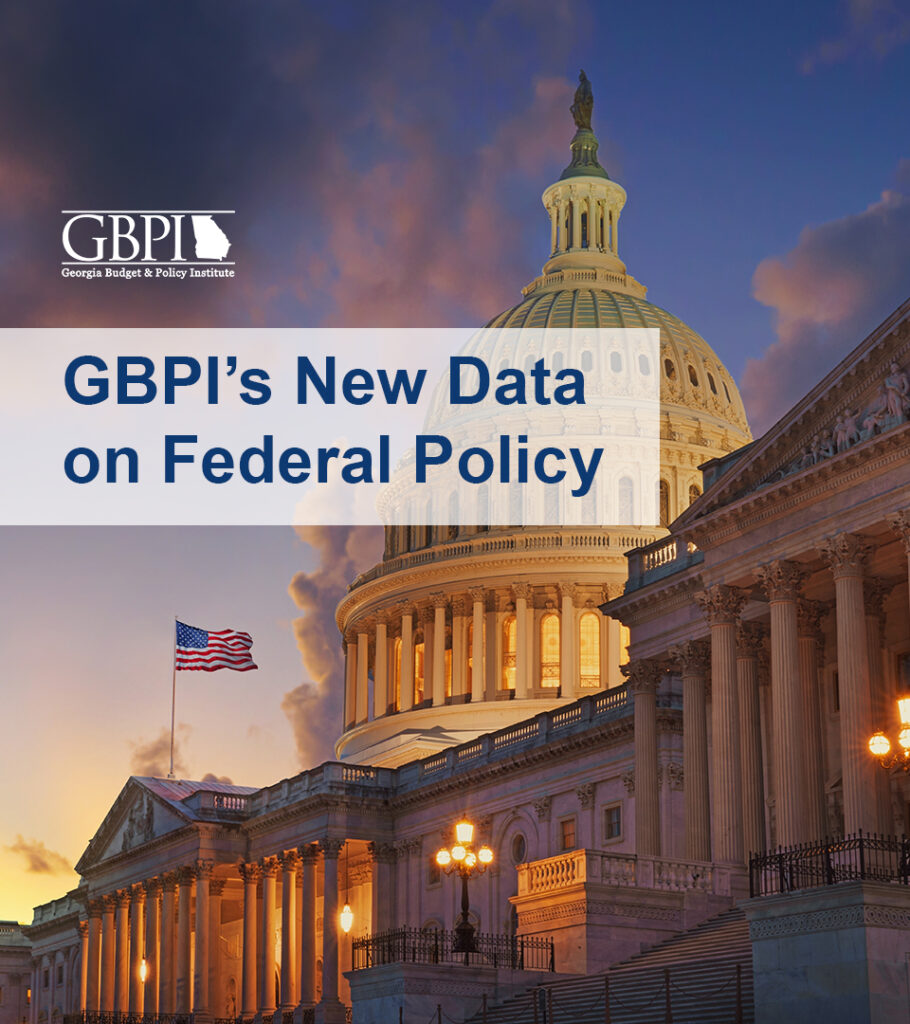In 2018, GBPI launched People-Powered Prosperity (PPP), an economic vision and policy agenda for Georgia focused on leveraging the state’s most powerful economic asset—its people. PPP detailed a plan for how state leaders could pursue strategies to help all Georgians thrive and pay for the plan responsibly. To bolster GBPI’s research and advocacy by activating Georgians, GBPI relaunched the PPP campaign in January 2020 with strategic partners Small Business Majority, 9to5 Georgia and Faith in Public Life to engage workers, business owners and the faith community in advocacy around shared PPP policy priorities.
PPP culminated around four strategic goals:
- Educated Youth – Investing in high-quality education to build a solid foundation for a strong workforce.
- Healthy Communities – Ensuring people are healthy and can see a doctor when they are sick or access targeted services that support well-being.
- Strong Workforce – Advancing policies that support higher education, training programs and basic literacy to offer people lifelong learning opportunities to help minimize workforce gaps and empower Georgians to transform their lives.
- Thriving Families – Creating a strong safety net as a bridge to economic security for families who encounter unexpected disruptions in income or economic hardship.
Additionally, a stable, fair tax system was uplifted to buttress each of these goals. Through the work and activities of GBPI and its partners, including policy research, lawmaker and public education, and community outreach, the PPP campaign experienced momentum on 16 of 17 policy priorities from 2020 through 2023–including major progress on five policies.
PPP Scorecard, 2020 to 2023

Detailed Progress on Policy Priorities
Educated Youth
| Priority | 2020 | 2021 | 2022 | 2023 |
| Protect existing funding to ensure inequities in school resources are not worsened. | Lawmakers restored some K-12 public education funding during budget debates. However, the state still cut roughly $950 million in the final FY 2021 budget. | Lawmakers restored some K-12 public education funding during budget debates. However, the state still cut roughly $383 million in the final FY 2022 budget. | Lawmakers increased funding for the Department of Education by 5 percent, up $483 million, for FY 2023. | The FY 2024 budget appropriates $13.1 billion for education, which fully funds the Quality Basic Education formula (QBE) for K-12 public education. Additionally, SB 233, which would have funneled millions of additional public dollars intended for public schools to private schools in the form of vouchers, failed. Another voucher bill, HB 101, which would have increased the annual limit on the Qualified Education Expense Tax Credit to $130 million from $120 million, crossed over but failed to pass. |
| Update Georgia’s education funding formula to include an Opportunity Weight to support districts serving high numbers of low-income students. | No movement. | HB 10, which would create an Opportunity Weight, was filed this session. This bill has an opportunity to move next year in the 2022 Legislative Session. | HB 10, which would create an Opportunity Weight, was filed in 2021 and could have moved in 2022 but did not. | Several bills that would create an Opportunity Weight for K-12 students were filed, but no movement has been made on them yet. |
| Fully fund and expand education funding grants including equalization, sparsity and transportation | Lawmakers spared sparsity, equalization and transportation grants from budget cuts. Original budget proposals included steep cuts to these grants. | The FY 2022 budget increases equalization grant funding by $72 million, but this is based on a reduced formula from the Great Recession. Sparsity grants continue to be funded at a fraction of the formula requirements. | The amended 2022 Fiscal Year Budget includes significant funding to replace 1,747 buses statewide ($188 million) and provide a one-time $2,000 bonus to all bus drivers at a cost of $28 million. | No movement. |
Healthy Communities
| Priority | 2020 | 2021 | 2022 | 2023 |
| Expand Medicaid | Georgia has not expanded Medicaid due to the governor’s opposition. Gov. Kemp is instead pursuing a “partial” Medicaid expansion. | Georgia’s “partial” Medicaid expansion is under federal review and could be rejected. Full expansion remains the best choice. | The state is not currently implementing expanded Medicaid coverage under either Affordable Care Act (ACA) Medicaid expansion or the Pathways to Coverage waiver. | Despite beneficial federal financial incentives offered under the Affordable Care Act and the American Rescue Plan, the state legislature failed to pass legislation that would fully expand Medicaid eligibility for adults with lower incomes. In July 2023, Governor Kemp launched Pathways to Coverage, which expands access to healthcare coverage to some low-income Georgians who meet monthly work, higher education, volunteer, or other reporting requirements. |
| Extend postpartum Medicaid | In the 2020 Legislative Session, Georgia passed a bill to extend Medicaid for new mothers from 2 months to 6 months. | Georgia has received federal approval for the state’s waiver to extend Medicaid for new mothers from 2 months to 6 months. | Senate Bill (SB) 338 was passed by both chambers and, if approved by the federal government, extends postpartum Medicaid coverage to 12 months after giving birth. | Georgia received federal approval to extend postpartum Medicaid coverage to 12 months postpartum in October 2022. The federal Consolidated Appropriations Act of 2023 allows states like Georgia to make this postpartum coverage permanent (rather than a temporary option available for five-year increments as originally offered in ARPA). |
| End five-year waiting period for lawful permanent residents to access Medicaid | Georgia has not removed the five-year waiting period. | Georgia has not removed the five-year waiting period. | Georgia has not removed the five-year waiting period. | HB 19, the FY24 budget legislation, includes a line item that directs the Department of Community Health to amend the Medicaid state plan and remove the five-year waiting period for Medicaid-eligible pregnant women and children who are lawful permanent residents. |
| Invest in mental health and substance abuse treatment | The state has made increased investments, such as restoring substance abuse prevention funding, in 2020. However, programs are looking at $91 million in cuts in FY 2021. | Lawmakers restored some budget cuts this session, and Georgia is set to receive more than $91 million in federal relief for substance use disorder prevention and treatment and community mental health services. | House Bill (HB) 1013 passed both chambers and, among its many provisions, strengthens the state’s monitoring and enforcement of behavioral health parity. | HB 520, a bill that builds upon the momentum of last year’s bipartisan passage of the Mental Health Parity Act, failed to pass. One bill provision related to cross-agency data-sharing was added to SB 23, and other provisions are reflected in the budget language in HB 19. |
Stable, Fair Tax System
| Priority | 2020 | 2021 | 2022 | 2023 |
| Evaluate and trim back tax breaks for profitable corporations that do not deliver on their promise | Legislation passed unanimously in the Senate to allow for a select number of tax evaluations to be completed each year. | Legislation passed to allow for a select number of tax evaluations to be completed each year, but tax credits increased to more than $10 billion for FY 2022. | Provisions to cap the Film Tax Credit and remove “transferability” that allows the credit to be sold were introduced, but these measures ultimately failed. HB 1437 offers an opportunity to comprehensively review and improve all aspects of the state tax code. | HB 413, an incredibly risky tax bill, failed to pass. HB 413 would have established a program known nationwide as CAPCO but referred to locally as the Georgia Agribusiness and Rural Jobs Act (GARJA). Over the remainder of 2023, the state is also set to undertake a comprehensive review of existing tax credits and exemptions approved under last year’s HB 1437. |
| Enact a corporate minimum tax | No movement. | No movement. | No movement. | No movement. |
| Increase the state’s tobacco tax | Both the House and Senate introduced legislation to lift Georgia’s tobacco tax. | Lawmakers introduced legislation to lift Georgia’s tobacco tax again this year, but it failed to move. | Lawmakers introduced legislation to lift Georgia’s tobacco tax again last year, but it failed to move this year. | Lawmakers introduced HB 191, raising the tax on each pack of cigarettes from 37 cents to 57 cents, and HB 192, raising the tax on cigarettes and vaping products, but neither passed. HR 43, which would have established a joint study committee on the costs and effects of smoking, also failed to advance. |
| Modernize the sales tax to cover some services as the economy changes | Two measures passed to apply sales tax to rideshare services and marketplace facilitators, such as eBay and Etsy. | HB 594, which would create a digital downloads sales tax, was introduced this session but did not make it out of committee. | HB 594, which would create a digital downloads sales tax, was introduced last session but did not move this year. | SB 56 extends state and local sales taxes to digital goods and services, beginning in January 2024. In its first year of implementation (FY 2025), state estimators project the legislation would raise approximately $86 million in new revenues. |
Strong Workforce
| Priority | 2020 | 2021 | 2022 | 2023 |
| Fund a broad-based, need-based financial aid program | A bill that created a need-based aid program passed in 2018, but the state has yet to provide funding for this program. | Lawmakers considered using lottery reserves and potential sports betting revenues to fund a need-based aid program, but these measures did not pass. | HB 1435 passed and seeks to create need-based completion grants for students who have completed at least 80 percent of their degree program but face financial hardship. | HB 249 passed but was later vetoed by Gov. Kemp. This legislation would have lowered the minimum number of credit hours that must be completed for a student to receive a college completion grant. It would have also raised the minimum award per eligible student from $2,500 to $3,500. |
| Provide sustainable funding to meet needs of students participating in Dual Enrollment | HB 444 passed and includes a number of restrictions, but the changes are reasonable. The FY 2021 budget for Dual Enrollment did not include budget cuts on top of the changes made by HB 444. | The FY 2022 budget for Dual Enrollment decreased only based on enrollment. | The FY 2023 budget ultimately kept funding for Dual Enrollment flat after the governor proposed a $3 million increase. Cuts were avoided, but more progress is needed. | Budget cuts were avoided, but no additional progress was made. |
| Remove barriers to quality job training and supportive services for Georgians with low incomes | SB 288, which allows record restriction for some formerly incarcerated Georgians, passed. This marks a significant step forward to supporting returning citizens. | SB 105, which streamlines early termination of probation for those eligible and offers thousands of Georgians looking to re-enter the workforce the opportunity to rebuild their lives, passed. | SB 257, which builds on legislation that was passed in 2020, would have supported Georgians who were incarcerated and seeking employment by allowing for certain records to be automatically or retroactively expunged. The bill did not get a vote in both chambers but did pass the Senate. | HB 334, which would have expanded expungement in Georgia, was introduced but did not crossover. SB 157, which would have expanded Georgia’s expungement process and streamlined decision processes in occupational licensing boards so Georgians with criminal records could receive more consistent occupational licensing decisions, crossed over but failed to pass. |
Thriving Families
| Priority | 2020 | 2021 | 2022 | 2023 |
| Increase the availability of child care subsidies to serve more students and low-income families | Child care subsidies were extended to student parents seeking a bachelor’s degree. | Lawmakers added $3.5M in the FY 2022 budget to increase slots for child care assistance for low income families. | The state increased its investment in child care services, which include the Childcare and Parent Services (CAPS) scholarship program, by about $3.7 million. | The FY 2024 budget does not include additional resources for Child Care Services above the Governor’s initial proposal of $1 million. However, the CAPS program was able to serve approximately 10,000 more children with federal relief funds, which will expire in fall 2024. |
| Pass a state-level earned income tax credit, or Georgia Work Credit | The House introduced legislation to create a Georgia Work Credit in 2019. | Several bills were introduced this session to enact a GWC, but none of these made it to the governor’s desk. | Members of the Senate Finance Committee and the full Senate voted on an earlier version of HB 1437 that would have created a non-refundable EITC, valued at 10 percent of the federal level. This marks the first affirmative vote by a full legislative chamber to add an EITC to the state’s tax code, although ultimately the provision was not included in the final bill passed by the General Assembly. | HB 79 and SB 118, providing for a state earned income tax credit and child tax credit, were both filed but failed to advance. |
| Strengthen safety net programs by extending eligibility, removing barriers to enrollment and addressing program rules that end benefits to families before they are on sound economic footing | Lawmakers extended Unemployment Insurance to 26 weeks, suspended work requirements, named essential workers a “priority group” for CAPS and administered maximum benefits for SNAP households. | HB 91, which would increase maximum TANF benefits and better serve Georgians living in poverty, was introduced this session but did not make it out of committee. | No movement. | The legislature passed HB 129, which expands Temporary Assistance for Needy Families (TANF) access to pregnant women and eliminates the TANF family cap, which previously denied access to benefits for children born while another family member is receiving benefits. |
Onward and Upward
GBPI is grateful for its relationships with Small Business Majority, 9to5 Georgia and Faith in Public Life, which were strengthened by the PPP campaign. One partner noted that through this engagement, they gained “a more collective approach in educating and building awareness on PPP issues and how they translate into reaching our own goals and objectives.” By working together, progress was made toward advancing more equitable policies and building a broader ecosystem to increase community power for future campaigns. GBPI looks forward to continued collaboration with these partners across its policy issue areas.
Although the PPP campaign has come to an end, GBPI’s work is far from done. As pandemic-era safety net expansions unwind and workers agitate for better conditions and pay, Georgia enters a new era in the fight for economic security. Georgia leaders continue to tout that “Georgia is the number one state for business,” but that ranking comes at the expense of everyday Georgians and especially those with the lowest incomes. A different future is possible, where all Georgians have the resources needed to care for themselves and their loved ones and realize their full potential. Georgia’s state reserve accounts will likely exceed $16 billion as we enter the 2024 fiscal year, public dollars that could be used to better support Georgians needs. Now is the time to reinforce Georgia’s tattered safety net, improve job quality and wages and remove barriers to economic opportunity—like criminal legal system fines and fees.
Over the next four years, GBPI is excited to partner with ProGeorgia, the state civic engagement table, and table members, to design and launch a bold new economic security campaign for Georgia and mobilize residents to act. GBPI hopes to bridge research and policy advocacy with democracy efforts to engage more Georgians as advocates. GBPI will share updates as the campaign progresses.
GBPI is grateful to the Center on Budget and Policy Priorities, Rockefeller Foundation, Wellspring Fund, Stoneman Family Foundation, Sapelo Foundation, William Josef Foundation, Mary Reynolds Babcock Foundation, and the Annie E. Casey Foundation for their significant support and invaluable contributions to the People Powered Prosperity campaign.








